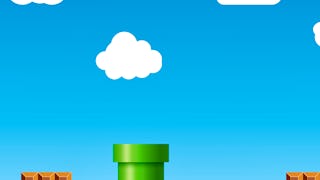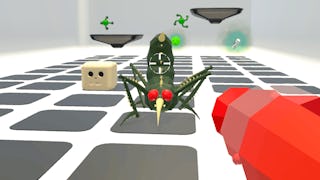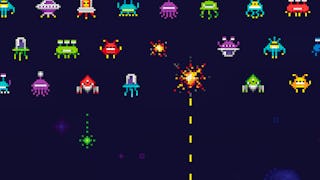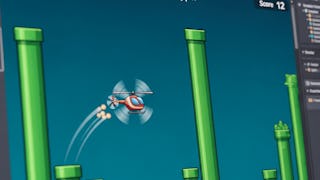If you love games and want to learn how to make them, then this course is your fourth step down that path. In this course you will learn the fundamentals of game design, including an understanding of game idea generation, design documentation, the business side of games, and social issues in games. You will continue developing video games using industry standard game development tools, including the Unity game engine. At the end of the course you will have completed a 3D Platformer game, and will be able to leverage an array of game development techniques to create your own basic games.

Enjoy unlimited growth with a year of Coursera Plus for $199 (regularly $399). Save now.

Game Design and Development 4: 3D Platformer
This course is part of Game Design and Development with Unity Specialization

Instructor: Brian Winn
6,448 already enrolled
Included with
(44 reviews)
Recommended experience
Skills you'll gain
Details to know

Add to your LinkedIn profile
4 assignments
See how employees at top companies are mastering in-demand skills

Build your subject-matter expertise
- Learn new concepts from industry experts
- Gain a foundational understanding of a subject or tool
- Develop job-relevant skills with hands-on projects
- Earn a shareable career certificate

There are 4 modules in this course
Are you ready to take the next step in your journey into game design and development? In this module, we will introduce the course and kick off your third game project, a 3D Platformer. In the first part of the assignment, follow along with the tutorial videos introduced in this module. In the second part of the project, you will modify the game to make it your own.
What's included
31 videos3 readings
Game making is about 10% inspiration and 90% execution. There's a significant difference between having an idea and beginning to turn that idea into something tangible. People often confuse the phrases "flushing out" and "fleshing out". Idea generation is about "flushing out" an idea. Design Documentation is focused on "fleshing out" your game idea or adding flesh to the skeleton of an idea to bring it to life. Idea generation (or ideation) and design documentation are the focus of this module.
What's included
8 videos11 readings2 assignments
This module is all about the impact of games on business and society. If you want to make a living at making games, it is important for you to understand the business side. And I encourage you, as an aspiring game developers, to ask questions about the social impact and context of your game. As a designer, it is important to think about the impact that your creativity could possibly have on the world.
What's included
9 videos3 readings2 assignments2 discussion prompts
In this last module, you will explore some additional resources, as well as do some soul searching on what your next step is related to game design and development. In this module, you will also finish up the 3D Platformer project, submit it for peer review, and peer review your fellow learners games. Finish the course strong!
What's included
1 video2 readings1 peer review1 discussion prompt
Earn a career certificate
Add this credential to your LinkedIn profile, resume, or CV. Share it on social media and in your performance review.
Instructor

Offered by
Explore more from Software Development
 Status: Free Trial
Status: Free TrialMichigan State University
 Status: Free Trial
Status: Free TrialMichigan State University
 Status: Free Trial
Status: Free TrialMichigan State University
 Status: Free Trial
Status: Free Trial
Why people choose Coursera for their career




Learner reviews
44 reviews
- 5 stars
81.81%
- 4 stars
11.36%
- 3 stars
4.54%
- 2 stars
2.27%
- 1 star
0%
Showing 3 of 44
Reviewed on Aug 9, 2021
Great course. Lead to extensive learning and hands on building
Reviewed on Feb 18, 2024
The course is very well-paced, easy to understand. This course teach me a lot in terms of game designing and planning.

Open new doors with Coursera Plus
Unlimited access to 10,000+ world-class courses, hands-on projects, and job-ready certificate programs - all included in your subscription
Advance your career with an online degree
Earn a degree from world-class universities - 100% online
Join over 3,400 global companies that choose Coursera for Business
Upskill your employees to excel in the digital economy
Frequently asked questions
To access the course materials, assignments and to earn a Certificate, you will need to purchase the Certificate experience when you enroll in a course. You can try a Free Trial instead, or apply for Financial Aid. The course may offer 'Full Course, No Certificate' instead. This option lets you see all course materials, submit required assessments, and get a final grade. This also means that you will not be able to purchase a Certificate experience.
When you enroll in the course, you get access to all of the courses in the Specialization, and you earn a certificate when you complete the work. Your electronic Certificate will be added to your Accomplishments page - from there, you can print your Certificate or add it to your LinkedIn profile.
Yes. In select learning programs, you can apply for financial aid or a scholarship if you can’t afford the enrollment fee. If fin aid or scholarship is available for your learning program selection, you’ll find a link to apply on the description page.
More questions
Financial aid available,

